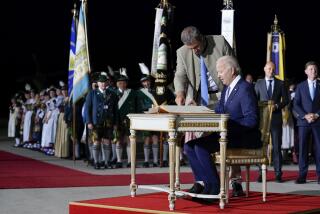Soviets’ Economic Reform Plan Not Likely to Satisfy U.S. : Summit: More radical changes by Moscow are needed before financial aid can be OKd, Administration says.
WASHINGTON — The Bush Administration does not expect to be fully satisfied with the new economic reform package that Soviet President Mikhail S. Gorbachev will bring to the Western economic summit in London next month, a senior Administration official said Wednesday.
While the plan is expected to call for a more concerted move toward free-market economics than previous proposals, it is unlikely to satisfy all U.S. concerns, the official said. “It will be more radical than we’ve seen so far, but not as radical as we’d like,” he predicted.
In addition, he said, Washington wants to see changes in the broader political climate--including deep cuts in Soviet defense spending, reduced aid to Cuba and resolution of the Baltic impasse--before agreeing to provide any significant U.S. economic assistance.
“There will be no ‘Grand Bargain’ ” struck at the mid-July summit of the world’s seven economic giants, the official said flatly. He was referring to an ambitious plan devised by U.S. and Soviet academics that calls for Western countries to provide Moscow with as much as $130 billion in assistance over the next three years.
Under the Grand Bargain plan, which envisions direct U.S. contributions of about $3 billion a year, the Soviet Union would convert to a free-market economy with such features as price decontrol, balanced government budgets and privatization of at least small businesses.
Instead, the official said, the White House would prefer to see a “grand process” unfold under which the West would provide aid for specific reform programs that have been “thought up in the Soviet Union.” The process of evaluating and funding such programs would span a number of years and “won’t be a one-shot deal,” he said.
President Bush wants Gorbachev to express an unqualified commitment to a free market at the London meeting--”a detailed program without hedges,” the official said. Up until now, he said, “we’ve got the words, but the body language hasn’t been right.” Existing Soviet programs have loopholes “that lead away from a free market” rather than toward one, he complained.
The official said the continued high level of Soviet defense spending, the flow of aid to Cuba and Moscow’s resistance to Baltic freedom all make it difficult for the Administration to contemplate seeking significant funds to help the Soviets. At the same time, he insisted that the three areas are not “conditions” that Moscow must meet before receiving aid.
The White House wants Moscow to engage in serious, good-faith negotiations with the Baltic republics of Lithuania, Latvia and Estonia on their demand for independence. It also wants the Soviets to make significant cuts in aid to Cuba, which currently runs about $5 billion a year.
Washington does not expect the Soviet Union to sever relations with Havana or to cut defense spending to the point that its security is endangered, the official said. But with Soviet resources being “squandered” now on these programs, the American people would oppose financial support for Soviet economic reform, he said.
He declined to specify the extent of cuts being sought in defense and Cuban aid.
More to Read
Sign up for Essential California
The most important California stories and recommendations in your inbox every morning.
You may occasionally receive promotional content from the Los Angeles Times.









